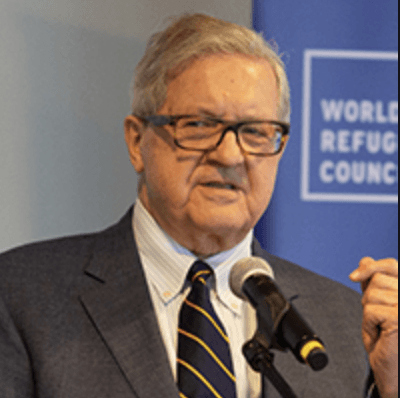Lloyd Axworthy is chair of the World Refugee & Migration Council and a former Canadian foreign minister. Allan Rock is a former minister of justice and attorney-general of Canada and Canadian ambassador to the United Nations. This article was first published in The Globe and Mail.
The killing of aid workers in Gaza highlights the need to protect the supply and distribution of humanitarian assistance. This week’s Israeli attack on World Central Kitchen’s convoy is only the most recent example: There are reports that more than 200 humanitarian workers have been killed since the conflict began last October. This breakdown of security, including increasing vigilantism from criminal groups, constitutes a major obstacle to efforts aimed at addressing the famine that now afflicts Gaza. Supplying aid is one thing, but making sure it reaches the people in need is a separate challenge. We believe that Canada can make a meaningful difference in meeting that challenge.
First, let’s look at the context. Momentum may at last be building toward addressing the conflict and its consequences in Gaza, where more than 32,000 people have been killed and a critical shortage of humanitarian supplies has led to famine. The United Nations Security Council last week adopted a substantive resolution on the conflict calling for a ceasefire, the return of the Israeli hostages held by Hamas and broadened humanitarian access.
A few days later, the International Court of Justice (ICJ) imposed new provisional measures in the pending proceeding arising from the conflict, requiring Israel to allow greater humanitarian access and report to the Court within one month on the steps it has taken to comply.
It remains unclear as to whether the Israeli government of Benjamin Netanyahu (which is dominated by extreme elements) will respect either the Security Council’s resolution or the measures imposed by the ICJ. As of this writing, humanitarian access to Gaza remains very limited. Some supplies continue to be airdropped and a floating pier is being constructed to allow deliveries by sea. But neither of those strategies will be sufficient to meet the urgent needs of the Palestinian population, and only the restoration of access for the hundreds of truckloads of supplies needed each day in Gaza will end the threat of starvation.
Meanwhile, negotiations between the parties, with the assistance of Egypt and Qatar, continue in Cairo toward agreement on a ceasefire, the release of Israeli hostages and broadened access for humanitarian relief.
But even if humanitarian access is enlarged, there remains a major obstacle to the safe and orderly distribution of supplies: namely, the absence in Gaza of a means to maintain order and protect aid workers. The Gaza police are not available to help: They have been decimated by the Israeli armed forces. Reliable reports last week detailed the chaos and violence that resulted when desperate crowds rioted while trying to reach airdropped food and water. Aid groups are at great risk in Gaza, as shown dramatically by Israel’s attack on the World Central Kitchen convoy.
The Israeli government itself seems to recognize the need to establish order in Gaza. During his visit to Washington last week, Israeli Defence Minister Yoav Gallant reportedly raised the possibility of creating a multinational military force with troops from Arab countries to improve law and order in Gaza and escort humanitarian aid convoys. Arab states later denied that they had offered such a protective force, saying instead that they might provide peacekeepers once a ceasefire is in place.
All of this sets the stage for Canada to play a constructive role in Gaza. Canada should press the Netanyahu regime to comply with the Security Council resolution and the ICJ order, and to abandon plans for a ground offensive in Rafah. Foreign Minister Mélanie Joly can build on the goodwill she created during her recent visit to the region by promoting the establishment of an international protective mission to Israel and Hamas that could be made up of police contributed by states acceptable to each party. Such a mission could provide protection for aid workers and security for the orderly distribution of supplies. The presence of an international protective mission might also deter the kind of cavalier or careless use of force that took the lives of the World Central Kitchen workers this week.
Canada can also work to persuade like-minded states to participate in that protective force. Even if we do not contribute Canadian personnel, we can provide valuable help with planning, logistics, communications and equipment.
Let’s seize this opportunity to make a positive difference in the effort to stop the violence in Gaza and avoid the loss of additional lives. Above all, let’s not be mere bystanders to a tragic conflict that has already been left far too long without a humane and effective international response.
Photo: ©UNRWA


